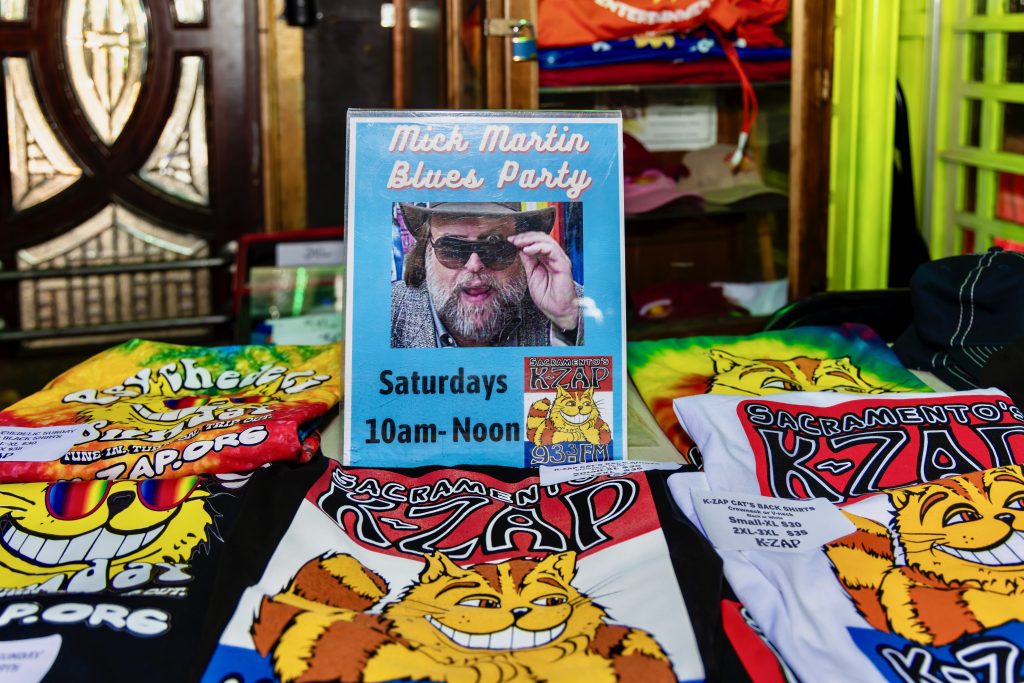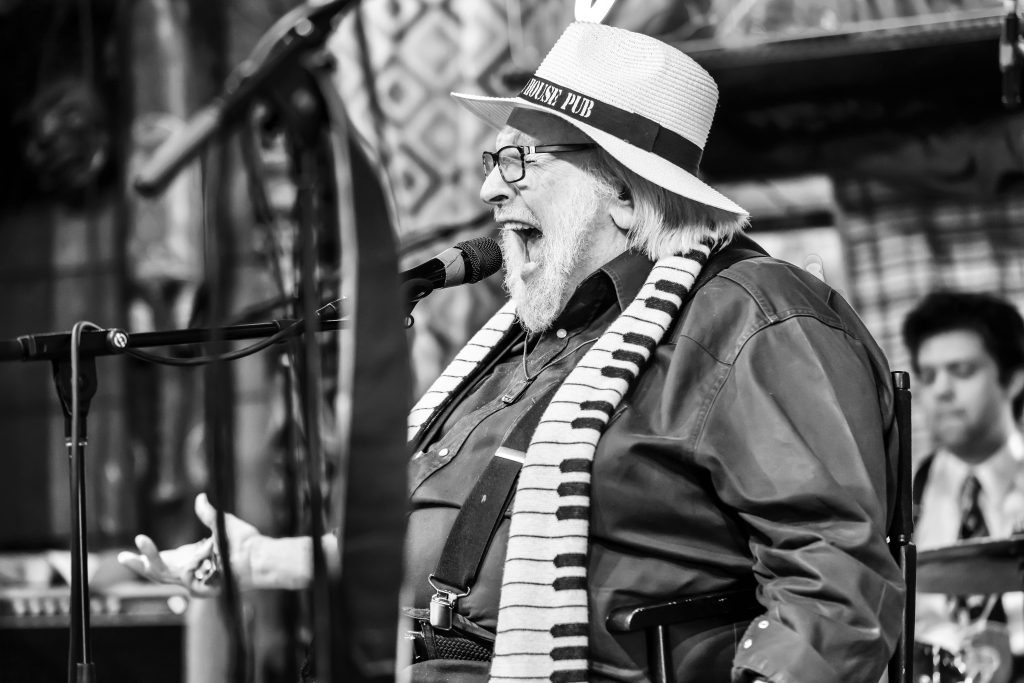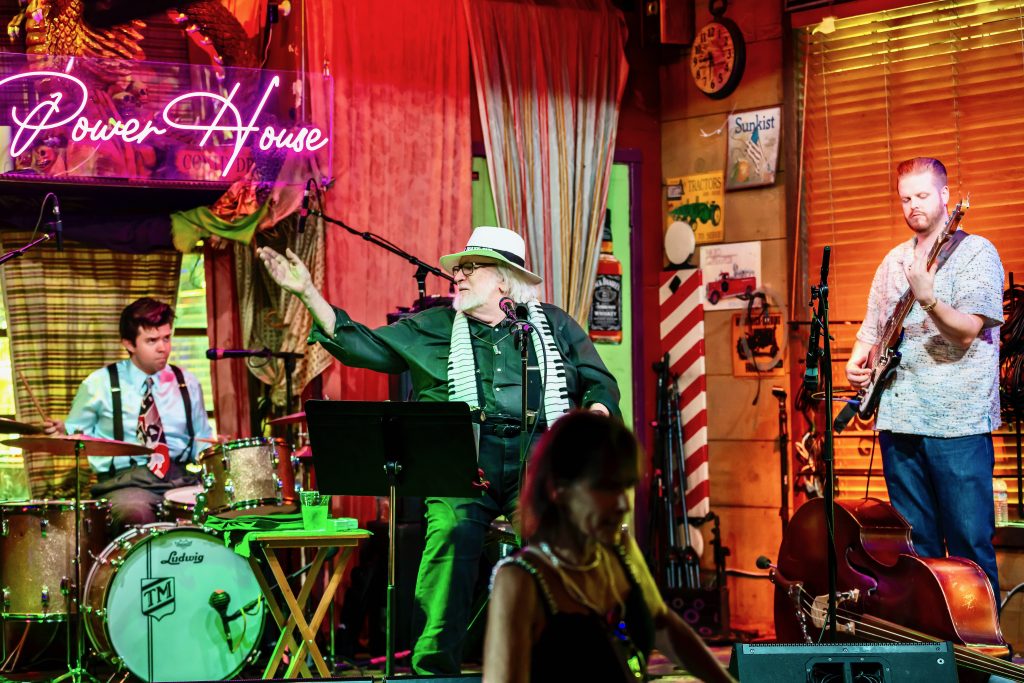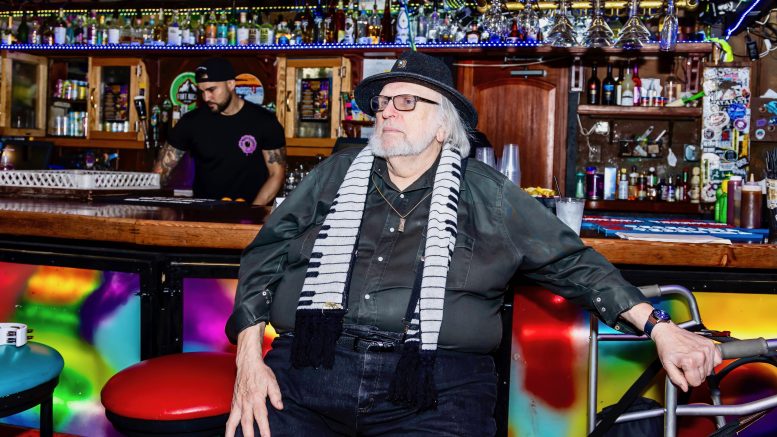By Joan Cusick
Two hours before his set begins at the Powerhouse in Folsom, bluesman Mick Martin is sitting on a corner bar stool in the pub, greeting everyone coming and going. .
Everyone knows Martin self-described as “the irreverent” who for nearly five decades has been Sacramento’s voice of entertainment: hosting Mick Martin’s Blues Party on CapRadio and now K-Zap; touring with his band Mick Martin and the Blues Rockers; reviewing movies for local print and broadcast media; and co-authoring the Video Movie Guide, originally published in the mid-1990s.
Martin’s interest in entertainment started early — and for a very somber reason.
“See, my brother died on my 10th birthday,” Martin said. “He was 6 years old. He was a genius—very funny, very smart. But he had a tumor on the brain. And when he died, my parents went away. I mean, he had been their pride and joy.”
“I was the shy kid. And so I made up my mind that I was going to figure out a way to get them to love me.”
For Martin, love came in the form of blues music. As a young teen, he listened to blues and jazz greats like Jimmy Smith, with whom Martin would go on to play Carnegie Hall in 1994. By then, he was hooked on the harmonica in the same way he was hooked on blues.
“To me, the harmonica is the sound of the human voice,” Martin said. “That’s kind of true of violin and the Hammond organ. … So I’m attracted to the human cry of music, and to me blues always had that.”
On a Sunday afternoon in June, the 75-year-old blues artist is celebrating the release of his latest album at the Powerhouse. The band is called Mick Martin & the Dixie Drifters, with Kyle Rowland on bass, Andrew Little on guitar and Todd Morgan on drums. Rowland, who is celebrating his 31st birthday, produced the record.
Martin first met Rowland about 20 years ago when his band was playing at the Sacramento Jazz Jubilee at Cal Expo. “We’re setting up, and the lead guitar player says, ‘Mick, can you hear that?’ And I said, ‘Hear what?’” Martin continued, “He says, ‘Listen. I heard the sound of a harmonica being well played.’”
“So I said, ‘Whoever’s playing the harmonica, can you please stand up?’ Nothing. ‘Could you stand up, please? Your harmonica playing is great.’ And then I heard his father say, ‘He is standing up.’”
“Kyle shared the stage with us anytime he wanted when he was a kid. But he’s got a fabulous career now and is now sharing the stage with me as an equal,” Martin said. “That’s what I feel that I’m most effective at, is helping other people because everybody needs that belief in themselves. I was shy, terrified of going to see Muddy Waters, and I ended up with him knowing my first name.”

What is your first memory that involves music?
Hearing Jimmy Smith on KFRC radio out of San Francisco doing “Walk on the Wild Side” in the early ‘60s. That’s the profound memory because I didn’t understand how music was supposed to go. You heard pop music, and the guitar was just OK, but this was like the revelation. I had no idea that in the ’90s Jimmy Smith would move seven minutes from my front door and I played Carnegie Hall with him [on March 31, 1994] and was on one of his CDs. It was a miracle.
I collected jazz as a kid. I’d go to Tower Records and I’d see the new Jimmy Smith and the new Beatles, and I would have a real conflict in my soul of which one I was going to buy. So jazz got deep into me in terms of the ability to play and create. And then I was able to have first-hand access to the man who changed it all. It was incredible.
When did you start playing music yourself?
Well, the story—and I’m sticking to it—was that I saw The Beatles on “The Ed Sullivan Show” [in 1964], and I thought, “Wow, this is great. They play music and they’re all buddies. They’re good friends and chicks dig them.” So I wanted to play music.
I got fired from the first seven bands that I was in. I thought it was because I couldn’t sing. I sounded like Bo Diddley with a bad head cold. But it turned out they didn’t like the fact that I had girth: I was too fat. I heard this just recently. But that’s why every band I’ve had since then is “Mick Martin and the…” — because they can’t fire me.
You talked about jazz. You talked about blues. How do you define the two genres and which do you identify with?
I heard something very profound: You don’t choose the music you love, it chooses you. So when I was a kid, I got a feeling from things like the Isley Brothers’ “Shout” or Don Gardner and Dee Dee Ford’s “I Need Your Lovin’ Every Day.” I couldn’t define it, but other music seemed so lightweight.
The church is in the jazz I love, in the pop songs I love and, of course, in the blues.
I never really wanted to play music. I was in one band, the very first one. All I got to do was sing “Well, they’re out there having fun in the warm California sun.” That’s all I did on stage.
But I found the harmonica. And about the same time, I heard a song by the Rolling Stones. It was called “Little Red Rooster.” That was a Willie Dixon song recorded originally by Howlin’ Wolf. … I had noticed that because it stood out from the other Stones songs. Then I found Muddy Waters. Then I found Sonny Boy Williamson, who was my second harmonica god.
And to the other part of your question …when I was a kid, I got my great-uncle’s record collection of old 78s. There were a lot of old radio shows. Burns and Allen, Jack Manning. But there was one record by Larry Adler playing chromatic harmonica on “Rhapsody in Blue.” And I wore it out. There was no more shellac left on the surface. That’s when I fell in love with the harmonica.
So harmonica chose you like blues chose you?
About the same time I started playing in bands, I developed an interest in monster movies. There was a magazine at the time … called “Famous Monsters of Filmland.” I sent in a letter that was published in there and this guy, Jeff Hughson, calls me up and says, “I love monsters too.” What I didn’t know was that he had Howlin’ Wolf’s harmonica and he took me to meet — not just see — Muddy Waters and John Lee Hooker.
He’d say, “I wanna go see Muddy. He’s at the Freeborn Hall in Davis.”
I said, “Well, tell me how it is.”
He said, “No, you’re going.”
I was a shy kid, but he force-fed me the real experience of seeing the elders of Chicago blues. Look, I don’t think that any of this was by my design, I feel that some of us are so fortunate to have people who impact our lives for a reason of kindness and shared joy.

How did you make the leap from blues music and monster movies to your work in radio, television and newspapers?
I’ve been thinking a lot about Bob Wilkins. He was on Channel 3 and later Channel 40 as a horror movie host. I was such a fanatic that I called him up and suggested this and that, and he said, “You want to be on the TV show?” And I said, “Yeah.”
So I went on TV, really having the shakes, but people were saying, “You look so comfortable on TV.” At that time, I was writing for anybody who would have my reviews and columns about anything — comic books, music and movies. Bob Wilkins found out that I was looking for a job and I swear to you, he called me every other week. “Have you started working for the Sacramento Union yet? Have you gone down there and talked to him?”
“No, Bob.”
I was, as usual, terrified, but he wouldn’t leave me alone. So I ended up going down there and, of course, I didn’t know what I was doing. But throughout my life, I’ve realized that other people don’t know what you’re doing either — especially if you’re an entertainment specialist.
I remember Bob Carney, who was the managing editor, came over to me one day and said, “Where do you find all these weirdos?” I didn’t have the heart to tell him they were all my heroes. So anyway, it’s like when you’re doing something that nobody cares about, you can get away with murder.
How has your music evolved over the years?
In the beginning, everybody wanted to play Rolling Stones songs. It was easy for me to pick the bluesier songs they did or to play “Got My Mojo Working” by Muddy Waters. That was an up-tempo song.
I was a harmonica player, trying to play like Sonny Boy Williamson and get that sound that Larry Adler had on the chromatic, which is the big harmonica with the slider. I kept edging more and more towards the blues because the thing about the diatonic harmonica, as opposed to the chromatic, is that you’re playing to a blues progression and you can’t make a mistake. You can play better but you’re not going to hit a sour note. So I was drifting toward that kind of perfection that I thought maybe I could get.
The first band of significance was called Joshua. We played at the Fillmore and we were a psychedelic band, but we were doing blues.
The next band was called Smith Martin & Shaw, and I was the blues guy. The other guy was folk. The other one was kind of like the Elton John. And anyway, we got all the way to CBS records and it was brutal. We almost got a record contract, except everybody in the band had a meltdown. That band broke up, and then I put together another band called Orion Express. And all of our equipment burned up in a fire in Fair Oaks. I was terrified.
I was a stringer for the Sacramento Union by then, doing reviews. They’d call me up and offer me a film and tell me the date. I’d say to my wife, “Honey, we can’t go to your mom’s birthday. I’ve got to go review this movie.” So it became easier and easier for them to get somebody to review the movie. Because I always said yes.
Anyway, when the fire happened in 1976, I was working wherever I could. Then I got a call to do my first movie review — “Star Wars,” something a comic book, monster movie sci-fi nut was joyous over. And it went on from there. I wrote about Muddy Waters. I wrote about the editor of Famous Monsters. I wrote about Ray Bradbury. Those were the weirdos.

When you’re telling somebody your life story, what’s important for them to understand?
That I’m blessed. That I did not do it myself. That I had over a dozen mentors who pushed me, offered me things out of the goodness of their heart.
There were weird coincidences. When I was the film critic at the Union, I was starting the band Mick Martin and the Blues Rockers. The only time I ever left the North American continent was when I went to London on a junket to interview Mel Gibson and Goldie Hawn for their movie “Bird on a Wire.” In London, I met these people I had corresponded with who were the fans of blues. They took me to meet a gentleman in Oxford, England named Philip Guy Davis. And Philip ended up managing us. We toured England and Germany and Belgium and Italy. I mean, who ends up with the best friend of Brian Jones, from the Rolling Stones, being their manager? You tell me that makes sense. It doesn’t to me.
One opportunity led to another.
I have never done anything for the purpose of gaining good karma, but I’ve never been able to do anything to harm another person. I don’t believe that entertainers are in a race, whether they’re actors or filmmakers or musicians. I support people because I wouldn’t be able to do what I do without the goodwill of so many others.
In addition to your TV reviews and radio shows, you also wrote books of movie reviews.
A guy named Cary Nosler who worked with me at KZAP, which was my first flirtation with radio, called up one day and said, “Mick, you got to write a book, I’m tired of renting turkeys.” It was the perfect time because they were giving me trouble at the Union. So [I] wrote the book under the worst circumstances. I mean, it’s an epic in itself, but it became a bestseller because we put it together in a pamphlet.
I took the pamphlet to Russ Solomon at the Tower headquarters, because the first job I’d had was at Tower Records. He put it in their new video store, opening at Trump Tower in Manhattan. And in three months, we had a deal to create the book, the Video Movie Guide.
What are your thoughts about staying active as you get older?
Well, I did become very ill at one point. Everything in my life has got to be a big deal, right? They took my radio show away from me. I couldn’t go into the studio. The band broke up. My mother died. My favorite vehicle got crashed on the freeway in the only storm we had that year. Plus, I was on medication for arthritis back then.
So all of a sudden, everything’s gone. And the doctor said, “Well, that’s OK. You can retire.” I said, “Why? Look, what I do feeds my soul.”
These people here today — whether it’s two or 200 — are going to make me feel like I’m 12 years old again. So, retire? I can’t even spell it.
This story was funded by the City of Sacramento’s Arts and Creative Economy Journalism Grant to Solving Sacramento. Following our journalism code of ethics and protocols, the city had no editorial influence over this story and no city official reviewed this story before it was published. Our partners include California Groundbreakers, Capital Public Radio, Outword, Russian America Media, Sacramento Business Journal, Sacramento News & Review, Sacramento Observer and Univision 19.




Loved this story from a real Guy. If I were younger & lived closer to Folsom, I would be there. Harmonica, my fav?